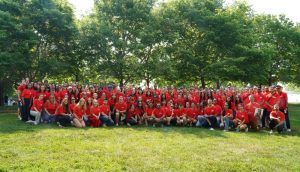
Once a week, Initiative’s Ishma Alexander-Huet has been offering a lesson she has learned after a year of asking questions about how to make the media and advertising industries more equitable. Read all of her lessons here.
By Ishma Alexander-Huet
ICYMI: My mother is white.
I didn’t mention this in previous articles because it wasn’t relevant to those lessons. I love the white side of my family, but I don’t experience the world the way they do. When I was 13, I got caught doing something foolish that 13-year-olds do, and my mum gave me the talk:
“You can’t get into trouble like that Ishy. You’re Black, people will always be harder on you and look at you differently.”
My father had moved back to Trinidad and my mother strongly supported me spending alternate weekends and long summer stretches with my dad’s sister and my cousins saying, “She can teach you things I can’t about being a Black woman.” I travelled with her, at one point I lived with her, and I called her “Ma.” My aunt became my second mother.
As a parent, I realize that could not have been easy. My mother had the power to selfishly keep me to herself or share me for all of our benefit. With that power came the responsibility (yes, I went there) of doing whatever work was needed to make sure I had role models that looked like me to contribute to my sense of belonging and had the skills to be successful in life. It wasn’t my aunt’s responsibility, but she was in without question. Besides a friendship, my mother and aunt shared a trust and common interest that was bigger than them both: preparing me for the world so I could get the most out of it. My Black aunt was my white mother’s ally in making change for me.
Ally
al·ly
noun
1. Someone who helps and supports someone else:
“She consulted someone who had always been a staunch friend and ally.”
2. Someone who helps and supports other people who are part of a group that is treated badly or unfairly, although they are not themselves a member of this group:
“Allies use their power to create a more inclusive workplace where everyone can thrive and find ways to make their privilege work for others.”
The definition of allyship has now evolved to include this second meaning, according to Oxford. Using the example of my family, this is counterintuitive. If an ally is meant to support someone else, then aren’t we, as the Black and equity-seeking communities, the allies that the people in power need to make change?
It’s semantics, and I’m not on a mission to change this specific term, but here’s why it’s important to think about: despite the example in the definition above, too often the onus stays on the disadvantaged group to make change, while others choose if and how much to support to offer under the term “ally.” It allows someone to claim the banner without truly doing any of the work, and it creates a barrier for true allies to make change.
We need trust
Since George Floyd’s murder, I’ve seen many from the white community realize that they had the power to create change for others and the responsibility to do the work. Like my mother, they could try to keep the status quo for their own gain but instead chose to step up to accelerate change, not only to right wrongs, but because they realize that we will all benefit.
At my work, the response was quick. Like most of the world, my executive leadership team realized they had to react, but they also believed something had to truly change and they would have to do the work.
They began to navigate this unfamiliar territory and understood that, as leaders, they needed to own and drive the change, but they lacked the lived experience to do it on their own. Power isn’t enough to create change, you also need the insights. They needed “my aunt” for guidance.
I wrote about the experience of my agency’s president (now CEO), Helen Galanis, seeing my Instagram post about George Floyd’s murder and asking if I would be open to sharing it with the agency. What I didn’t recognize at the time was that I was willing to do it because we share a level of trust. It was scary, but I knew she truly wanted to be an agent of change and needed some help to make sure we did it right for everyone’s benefit. She needed an ally.
As I’ve become more active on my mission to help Black talent thrive without barriers in Canadian advertising, I’ve willingly volunteered to play this role of an ally to white people who are trying to do the work. I think it’s a necessary part of the formula for change, but I’m selective. I have to have some level of trust, and still I’m taking a leap of faith. It makes me vulnerable, so I shouldn’t have been surprised this past year while having many discussions with groups, organizations, or individuals with similar objectives to my own to realize that not everyone was willing to do the same. That’s when I understood the paradox of allyship.
Paradox
par·a·dox
noun
A statement or proposition that, despite sound (or apparently sound) reasoning from acceptable premises, leads to a conclusion that seems senseless, logically unacceptable, or self-contradictory.
“The white community needs to do the work to create change as the community in power and remove the burden from the BIPOC communities, but they can’t do it without the BIPOC community putting in additional work to provide insight and guidance.”
You may be wondering why, if we have the most to benefit, the BIPOC community wouldn’t just eagerly raise our hands to put in the additional work. Here are my top five reasons:
1. We focus our efforts on directly supporting our community, which already deals with the lack of privilege, rather than on educating the privileged.
2. We are tired. We’re doing our own work just to survive and help our families thrive, while potentially dealing with resulting mental health impacts of systemic racism.
3. We have been burned before. We are waiting to see who is actually willing to do the work before investing our time.
4. We are vulnerable. How can I tell a true ally from someone who doesn’t see me as their equal? There’s a lot at stake because we don’t hold the majority of power – what happens if we make an ally too uncomfortable?
5. We shouldn’t have to.
So, what happens? I’ve seen this play out in one of three basic ways:
1. Some allies try to go through the change checklist without us and encounter the inevitable missteps; any trust from the BIPOC community is eroded.
2. The bulk of the work gets put on us validating beliefs that the ally’s promises weren’t genuine; any trust from the BIPOC community is eroded.
3. A level of trust and humility is found on both sides based in the belief that this is bigger than any one of us, and change begins.
What can you do to create this level of trust?
For equity-seeking groups:
● Start small to build trust with allies. As CNN’s Don Lemon says, “Make a friend who doesn’t look like you.” Get comfortable with one or two potential allies and learn their perspective to understand how they see the ally role.
● Offer feedback to allies that you see doing the work. We see a lot of missteps that are obvious to us, but unfortunately, it’s not obvious to someone who’s been living with a different lens. Be realistic about where unconscious bias comes from and understand what our allies truly don’t know, even when they should.
● Take a leap of faith once you’ve seen signs that the intentions are real, despite missteps. It’s not fair, because we have more to lose, and we will get burned along the way, but this is bigger than us and success means more opportunities for the next generation.
And for allies:
● Take the onus upon yourself to Do. The. Work.
● Be vulnerable. Be up front about your intent and humble about what you know and don’t know. Ask for feedback by saying “I’m trying, but I’m going to slip up, and I’d appreciate you calling me out if I say something that’s incorrect or offensive. I know that’s not your job and might be hard, but I want to learn.”
● Reach out for guidance from equity-seeking groups. Omitting us from your process only fragments our collective efforts of making change and sends the message that you don’t care about our perspective – it doesn’t help to advance our efforts, in fact, it takes us back to square one.
● Take a page from my mom’s book. When it feels awkward and uncomfortable or even scary, push through as if your child’s opportunity to grow up with equity depends on it.
Thank you for reading
And so, we’ve reached the end of this series summarizing the eight lessons I’ve learned while fighting for change since the murder of George Floyd. If you’re tracking, you’ll realize we only dove into seven lessons covering the job to be done, mental health, role of a DEI title, colourism, cultural impact of formative years, intersectionality of being Black and autistic, and the paradox of allyship. Did I miscount?
Not to get too meta, but the eighth lesson was what I said in the very beginning, that I realized how much I didn’t know. There is so much to learn and even while putting this series together I’ve found more areas that I want to dive into. If I’m going to achieve my objective then I have to keep to my new formula of learning, implementing, sharing – repeat.
Until I’m ready to share again, I’m wishing everyone more equity and fewer barriers to being your authentic self on your own journey of learning.
 Ishma Alexander-Huet is VP, client advice and management, head of learning and culture at Initiative.
Ishma Alexander-Huet is VP, client advice and management, head of learning and culture at Initiative.























